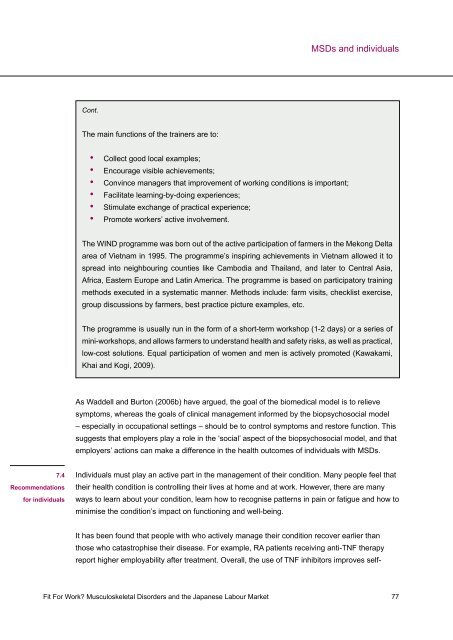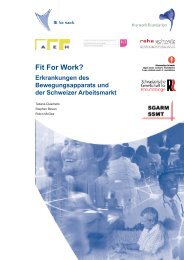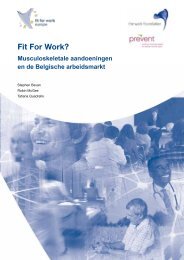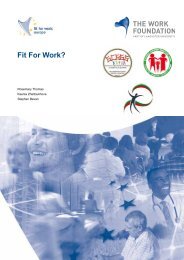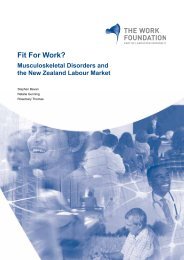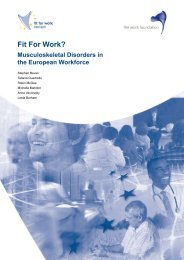English version - Fit for Work Europe
English version - Fit for Work Europe
English version - Fit for Work Europe
You also want an ePaper? Increase the reach of your titles
YUMPU automatically turns print PDFs into web optimized ePapers that Google loves.
7.4<br />
Recommendations<br />
<strong>for</strong> individuals<br />
Cont.<br />
The main functions of the trainers are to:<br />
• Collect good local examples;<br />
• Encourage visible achievements;<br />
• Convince managers that improvement of working conditions is important;<br />
• Facilitate learning-by-doing experiences;<br />
• Stimulate exchange of practical experience;<br />
• Promote workers’ active involvement.<br />
MSDs and individuals<br />
The WIND programme was born out of the active participation of farmers in the Mekong Delta<br />
area of Vietnam in 1995. The programme’s inspiring achievements in Vietnam allowed it to<br />
spread into neighbouring counties like Cambodia and Thailand, and later to Central Asia,<br />
Africa, Eastern <strong>Europe</strong> and Latin America. The programme is based on participatory training<br />
methods executed in a systematic manner. Methods include: farm visits, checklist exercise,<br />
group discussions by farmers, best practice picture examples, etc.<br />
The programme is usually run in the <strong>for</strong>m of a short-term workshop (1-2 days) or a series of<br />
mini-workshops, and allows farmers to understand health and safety risks, as well as practical,<br />
low-cost solutions. Equal participation of women and men is actively promoted (Kawakami,<br />
Khai and Kogi, 2009).<br />
As Waddell and Burton (2006b) have argued, the goal of the biomedical model is to relieve<br />
symptoms, whereas the goals of clinical management in<strong>for</strong>med by the biopsychosocial model<br />
– especially in occupational settings – should be to control symptoms and restore function. This<br />
suggests that employers play a role in the ‘social’ aspect of the biopsychosocial model, and that<br />
employers’ actions can make a difference in the health outcomes of individuals with MSDs.<br />
Individuals must play an active part in the management of their condition. Many people feel that<br />
their health condition is controlling their lives at home and at work. However, there are many<br />
ways to learn about your condition, learn how to recognise patterns in pain or fatigue and how to<br />
minimise the condition’s impact on functioning and well-being.<br />
It has been found that people with who actively manage their condition recover earlier than<br />
those who catastrophise their disease. For example, RA patients receiving anti-TNF therapy<br />
report higher employability after treatment. Overall, the use of TNF inhibitors improves self-<br />
<strong>Fit</strong> For <strong>Work</strong>? Musculoskeletal Disorders and the Japanese Labour Market 77


